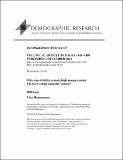Files in this item
Why does fertility remain high among certain UK-born ethnic minority women?
Item metadata
| dc.contributor.author | Kulu, Hill | |
| dc.contributor.author | Hannemann, Tina | |
| dc.date.accessioned | 2017-01-24T15:30:19Z | |
| dc.date.available | 2017-01-24T15:30:19Z | |
| dc.date.issued | 2016-12-02 | |
| dc.identifier | 248976559 | |
| dc.identifier | 21d95422-f736-4d36-abf1-bf1e1bf51fe7 | |
| dc.identifier | 85006922928 | |
| dc.identifier.citation | Kulu , H & Hannemann , T 2016 , ' Why does fertility remain high among certain UK-born ethnic minority women? ' , Demographic Research , vol. 35 , 49 , pp. 1441-1488 . https://doi.org/10.4054/DemRes.2016.35.49 | en |
| dc.identifier.issn | 1435-9871 | |
| dc.identifier.other | ORCID: /0000-0001-8808-0719/work/75996980 | |
| dc.identifier.uri | https://hdl.handle.net/10023/10166 | |
| dc.description | The research leading to these results has received funding from the European Union’s Seventh Framework Programme (FP7/2007‒2013) for the research project FamiliesAndSocieties under grant agreement no. 320116. | en |
| dc.description.abstract | Background : Previous research has shown high total fertility among certain UK-born ethnic minorities, but the reasons behind their high fertility have remained far from clear. Some researchers attribute their elevated fertility levels to cultural factors, whereas others argue that high fertility is the consequence of their poor education and labour market prospects. Objective : This study investigates fertility among the descendants of immigrants in the UK and examines the determinants of high fertility among certain ethnic minority groups. Methods : We use data from the Understanding Society study and apply multivariate event history analysis. Results : The analysis shows, first, that relatively high second-, third-, and fourth-birth rates are responsible for the elevated total fertility among certain UK-born minorities, especially women of Pakistani and Bangladeshi origin. There is little variation in the first-birth rates among natives and immigrant descendants. Second, although fertility differences between ethnic minorities and native British women slightly decrease once religiosity and number of siblings are controlled for, significant differences persist. We conclude that cultural factors account for some elevated fertility among ethnic groups in the UK, whereas the role of education and employment seem to be only minor. | |
| dc.format.extent | 50 | |
| dc.format.extent | 3227545 | |
| dc.language.iso | eng | |
| dc.relation.ispartof | Demographic Research | en |
| dc.subject | GF Human ecology. Anthropogeography | en |
| dc.subject | 3rd-DAS | en |
| dc.subject.lcc | GF | en |
| dc.title | Why does fertility remain high among certain UK-born ethnic minority women? | en |
| dc.type | Journal article | en |
| dc.contributor.institution | University of St Andrews. Geography & Sustainable Development | en |
| dc.identifier.doi | 10.4054/DemRes.2016.35.49 | |
| dc.description.status | Peer reviewed | en |
This item appears in the following Collection(s)
Items in the St Andrews Research Repository are protected by copyright, with all rights reserved, unless otherwise indicated.

